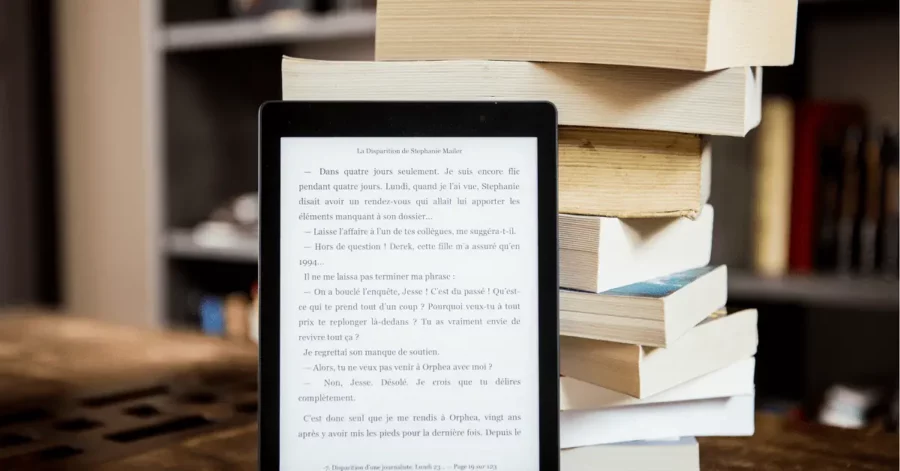E-books vs physical books. Maybe you’ve been in a similar situation. Whether in a thrift shop, an estate sale, or a listing on an online share site, you find yourself wrestling with the question, “Should I really buy another book? Or should I just get an e-book?” Your shelves are full. Your online retailer wish list is ridiculous. You’re comfortable with the reality that books stand in for end tables and plant stands and are your favorite accessory in home décor. Maybe it’s just the opposite. You have kept your inventory of books to a minimum and do an outstanding job of having only as many books as shelves to house them.
Either way, you must decide: will you buy a printed book, or will you go digital?
The Dilemma: Conflicting Formats
Part of your dilemma is you know full well that you could very likely find the exact same title in e-book format. You wouldn’t have to find space, it’s probably available in less than three swipes, and the convenience of not having to manage another “thing” is attractive. Living in a world that has integrated so many digital options, we all face the tension between the advantages of printed books over e-books.
Leigh Bortins, Classical Conversations founder, has referred to herself as the “keeper of the books,” and as a homeschool curriculum provider and bookseller, we here at CC feel strongly about paper books. We’re not opposed to e-books. We certainly won’t tilt our noses at your decision. However, we are committed to preserving the value of printed books. After all, one of the distinctives of the Classical Conversations experience and something that enriches local communities are the curriculum guides. Required resources for your community day, the Foundations Guide, the Essentials of the English Language Guide, and the Challenge guides are invaluable tools. And, of course, buying physical books is one way you can support your CC Bookstore.
The Contenders: E-books vs. Physical Books
First, definitions.
E-books are a digital format intended for display on computer screens or electronic devices. They come in a variety of file formats (EPUB, DjVu, PDF, and Kindle, just to name a few).
Physical books, of course, are written or printed on paper or some other physical medium.
Either format holds its own rather well in the e-books vs. printed books debate. Any quick internet search with terms like “e-books vs. printed books” or perhaps “Why are physical books better than e-books?” will yield thoughtful articles, pro/con lists, and plenty of arguments on the merits of either format.
Topics range across portability, affordability, distractibility, academic performance, and inventory management. No matter how you approach it, you’ll have no shortage of issues regarding the discussion of e-books vs. printed books!
Three Reasons to Buy Physical Books
There’s probably no right or wrong reason to hold to one side or the other on this matter.
Following are three reasons why you might determine physical books are better than e-books.
Reason #1. Ownership
This point is essential to the next reason, but it stands well enough on its own.
When you purchase an e-book, you only buy the license to read the content. E-books do not have a clear path of ownership, and even the retailer who sells the books doesn’t own the book; rather, the publisher has its own licensing agreement with its agents.
Even in the case of a CC digital resource like the EEL guide, although CC members can access it in the new CC Connected, it is not yours to keep, personalize, or have once your student finishes their Essentials tours.
But a printed book? That’s yours for as long as the binding holds and the pages remain intact.
Reason #2. Annotation
You can write all over the book!
You can highlight, doodle, cross reference, outright disagree, or put as many exclamation points as you’d like next to parts you love.
Sure, there are annotation tools in e-books. Still, you are limited to what the software allows compared to the endless ways you can personalize your books. And, let’s just be honest, annotation tools are slow and cumbersome.
Reason #3. Attention
One of the Five Core Habits (see page 7 of our online Catalog for more), Attending is far more potent when reading a physical book.
A paper book will more likely train you in the skill of deeper reading. E-books permit too many distractions and tempt your focus away from the text. A printed book encourages slower processing and offers physical cues through page-turning combined with the weight of holding the book, larger pages, no links, and concentrated singular lines of thought.
But Wait! There’s More in the E-books vs. Physical Books Debate
The transformative wisdom of Great Books means that reading as part of family culture and homeschooling provides timeless lessons right at your fingertips.
Emplaced within your home are artifacts that engage the senses. Your children can peer over your shoulder, touch and perceive the printed page, snuggle up in your lap or sit across the room. Literally you are “on the same page”!
Lessons of virtue and the story of heroes and villains are imprinted with your voice and the sights, sounds, smells, and senses of your physical home. There is a permanence and gravitas to a book on the shelf. When considering the physical books vs e-books debate, you’ll recognize the value of building a robust library for your family!
It is unlikely that you will pass an e-reader down through generations. As mentioned before, the books you download do not belong to you. Real paper books are privately owned. They can and do survive through the generations.
Here are two personal examples:
- Upon her Challenge graduation, my firstborn daughter received from her namesake (my mother) the well-worn but intact pocket-sized bible from her childhood. This precious book now bears two inscriptions.
- When ready to announce our first pregnancy, my husband and I purchased a children’s book and inscribed it with the good news before giving it as a gift to soon-to-be grandparents. What a delightful reminder of such good news and marker of the beginning of the next generation!
Surely you can think of other reasons, some of them rooted in personal preference while others are nested in research, why in the e-books vs. physical books discussion, “real books” come out on top. Again, remember, CC is not against e-books, but we do hope that you’ll agree—yes, better to buy the book!





